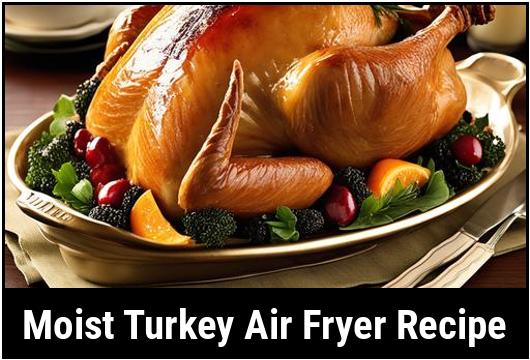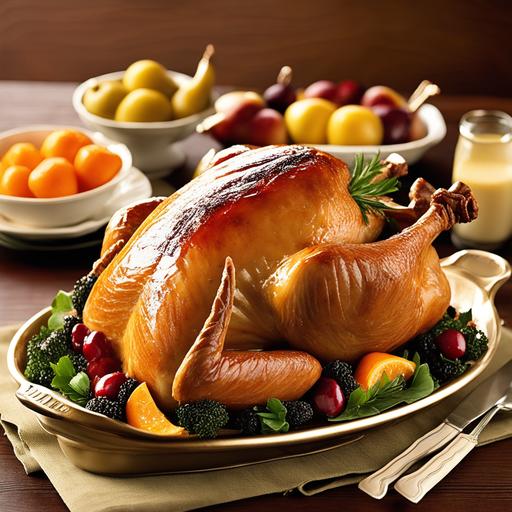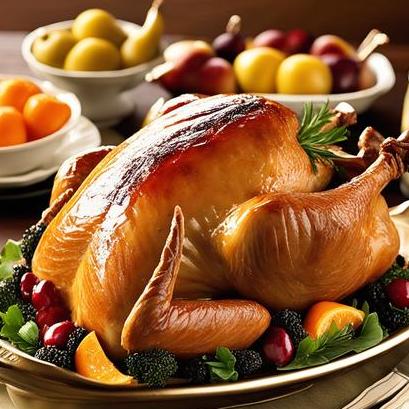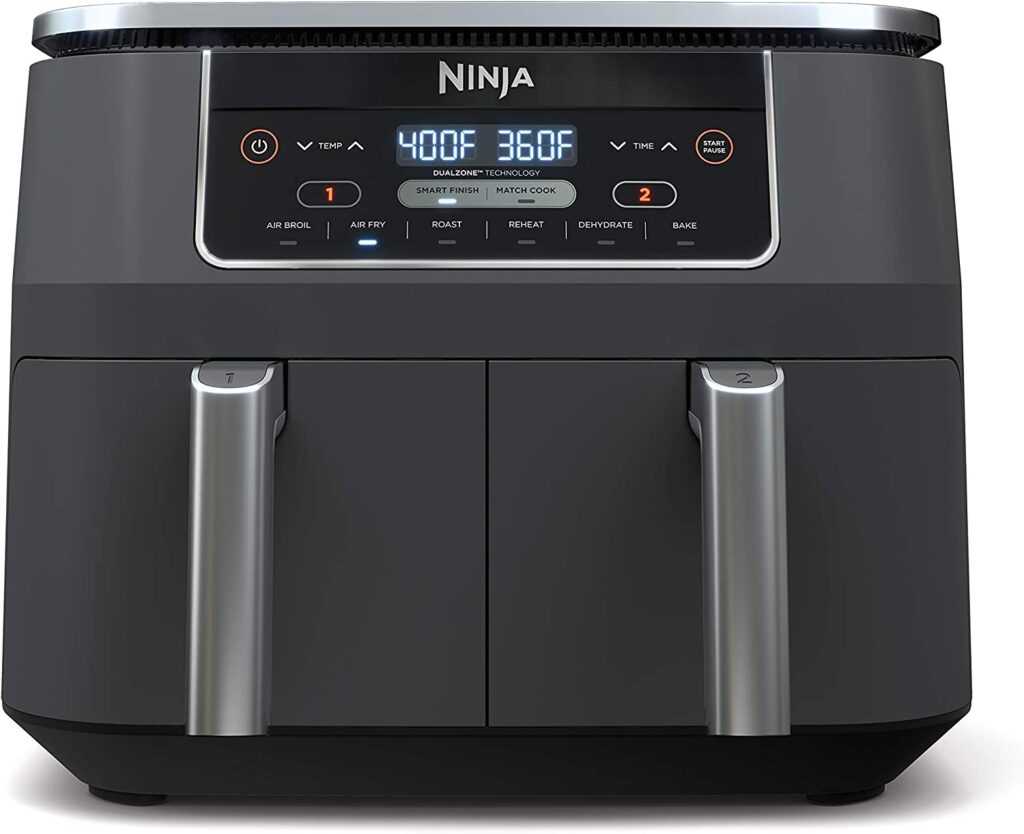The Moist Turkey Air Fryer Recipe: A Comprehensive Guide

When it comes to cooking a delectable Thanksgiving turkey, many home cooks are turning to the air fryer as their preferred cooking method. Air frying offers a healthier alternative to deep frying while still achieving a crispy and flavorful bird. In this comprehensive guide, we will delve into the science, culinary details, selection, cleaning, preparation, tips, variations, doneness checks, and of course, a mouthwatering and moist turkey air fryer recipe. So let’s get started!
Understanding the Food Science Behind Moist Turkey Air Frying
Before we dive into the culinary details and recipe, it’s essential to understand the food science behind air frying a moist turkey. When meat cooks, its muscle fibers contract and release juices. These juices contain both water and soluble proteins, which contribute to the overall moisture and tenderness of the meat. Traditional cooking methods, such as roasting or deep frying, can cause these juices to evaporate, resulting in a drier turkey. However, air frying presents a unique opportunity.
Air fryers work by circulating hot air rapidly around the food, creating a Maillard reaction—a chemical reaction between amino acids and reducing sugars that enhances food’s flavor and develops a delicious crispy exterior. This method not only helps to retain the natural juices of the turkey but also reduces cooking time. The result is a moist and juicy turkey with a golden and crispy skin.
Choosing the Right Turkey for Air Frying
Selecting the right turkey is crucial for a successful air frying experience. Ideally, choose a turkey weighing between 10 to 12 pounds, as larger birds might not fit in the air fryer’s basket. Additionally, opt for a fresh or thawed turkey rather than a frozen one for better texture and flavor.
Cleaning and Preparing Your Air Fryer

To ensure optimum performance and hygienic cooking, it’s essential to clean your air fryer before use. Start by carefully removing the baskets and trays. Wash them with warm soapy water, rinse thoroughly, and dry completely. Ensure there isn’t any lingering greasy residue that could affect the taste and texture of your turkey.
Preparing Your Turkey for Air Frying
Step 1: Thawing
If you’re using a frozen turkey, it’s crucial to thaw it properly before air frying. The safest way to thaw a turkey is by placing it in the refrigerator. Allow 24 hours of thawing time for every 4-5 pounds of turkey. Ensure the turkey is fully thawed before moving on to the next steps for even cooking.
Step 2: Brining (Optional but Recommended)
Brining your turkey before air frying helps infuse it with flavor and moisture. This step is optional but highly recommended for a truly succulent bird. Prepare a brine solution by dissolving 1 cup of kosher salt in 1 gallon of cold water. If desired, you can add herbs, spices, or even citrus slices to enhance the flavor. Submerge the turkey in the brine, ensuring it is fully covered, and refrigerate for 12-24 hours. After brining, rinse the turkey thoroughly to remove excess salt.
Step 3: Seasoning
Seasoning plays a pivotal role in elevating the flavor profile of your air fried turkey. You can keep it classic with salt, pepper, and herbs like rosemary and thyme. Alternatively, experiment with various seasonings and spices to personalize your turkey. Ensure you season both the cavity and the outer skin liberally.
Tips for a Moist and Flavorful Turkey
To further ensure your turkey is exceptionally moist and flavorful, consider the following tips:
-
Preheat the air fryer: Preheating your air fryer to the recommended temperature before inserting the turkey ensures even cooking and a crispier skin.
-
Basting and spritzing: During the cooking process, basting or spritzing your turkey with a mixture of broth, melted butter, or olive oil can help keep it moist and add an extra layer of flavor.
-
Using a rack: Placing the turkey on a roasting rack or trivet inside the air fryer basket elevates it from direct contact with the bottom, allowing hot air to circulate evenly for thorough cooking.
-
Misting with water: Spraying your turkey with water or broth at regular intervals can prevent the outer skin from drying out and enhance the overall moisture level.
-
Using a meat thermometer: Investing in a reliable meat thermometer is essential to check the doneness of your turkey accurately. This ensures that you achieve the perfect level of juiciness while avoiding overcooking.
Turkey Doneness Checks

To achieve the desired level of doneness, conduct regular checks using a meat thermometer. Here are the recommended internal temperatures for different turkey doneness:
- Turkey Breast: 165°F (74°C)
- Turkey Thigh: 175°F (79°C)
- Stuffed Turkey: The stuffing should reach an internal temperature of 165°F (74°C) as well.
Remember that these temperatures denote the safe minimum internal temperature for poultry consumption. If you prefer your turkey to be even juicier, consider removing it from the air fryer once it reaches an internal temperature a few degrees below the recommended level, as it will continue cooking while resting.
The Moist Turkey Air Fryer Recipe
Now that we’ve covered the foundational aspects, it’s time to delve into the step-by-step recipe for a moist and mouthwatering turkey cooked in an air fryer.
Ingredients:
- 1 fresh or thawed turkey (10-12 pounds)
- 1 cup kosher salt (for the brine)
- Seasonings and spices of your choice
- Broth, melted butter, or olive oil for basting
Instructions:
-
Preheat the air fryer to 375°F (190°C) for 5 minutes.
-
Thaw the turkey if necessary, ensuring it is fully defrosted before proceeding.
-
Optionally, prepare a brine solution by dissolving 1 cup of kosher salt in 1 gallon of cold water. Submerge the turkey in the brine, refrigerate for 12-24 hours, and rinse thoroughly.
-
Season the turkey generously with your desired seasonings and spices, covering both the cavity and the skin.
-
Place the turkey breast-side down on a rack or trivet inside the air fryer basket.
-
Insert the air fryer basket into the preheated air fryer and cook at 375°F (190°C) for 15 minutes per pound.
-
After the initial cook time, carefully flip the turkey breast-side up using tongs or oven mitts to avoid burns.
-
Continue cooking at 375°F (190°C) for an additional 10-12 minutes per pound.
-
While cooking, baste or spritz the turkey with your preferred mixture for added moisture and flavor.
-
Regularly check the internal temperature using a meat thermometer inserted into the thickest part of the breast and thigh. Ensure the breast reaches 165°F (74°C) and the thigh reaches 175°F (79°C).
-
Once the turkey reaches the desired internal temperature, remove it from the air fryer and let it rest for 15-20 minutes before carving. The resting period allows the juices to redistribute, resulting in a more succulent turkey.
-
Carve, serve, and enjoy your perfectly air-fried, moist turkey!
Variations and Serving Suggestions
While the basic moist turkey air fryer recipe is delightful on its own, here are a few variations and serving suggestions to elevate your culinary experience:
-
Herb-Infused Butter: Create a herb-infused butter by mixing softened butter with chopped herbs such as rosemary, thyme, and sage. Gently lift the turkey’s skin and spread the herb butter beneath it before air frying.
-
Citrus Glaze: Prepare a tangy citrus glaze using fresh orange or lemon juice, honey, and a pinch of salt. Apply the glaze to the turkey during the final stages of cooking for a zesty flavor.
-
Stuffing options: While it may not be feasible to stuff a turkey in an air fryer, consider preparing your favorite stuffing as a side dish or filling individual turkey breasts with it. This way, you can enjoy the classic flavors without compromising the integrity of the air frying process.
-
Cranberry Sauce: Serve your moist air-fried turkey with homemade cranberry sauce to complement the savory flavors. The tartness of the cranberries pairs exceptionally well with the moist turkey.
Conclusion
Air frying a turkey offers an exciting twist on traditional cooking methods, yielding a succulent and flavorful bird with a crispy exterior. Through understanding the food science, selecting the right turkey, proper preparation, implementing essential tips, conducting regular doneness checks, and exploring variations, you can confidently embark on your moist turkey air frying journey. So dust off your air fryer, gather your seasonings, and impress your family and friends with a tantalizing air-fried turkey that will be the centerpiece of your Thanksgiving feast. Enjoy!
Sources
FAQS On Moist Turkey Air Fryer Recipe
How Do I Prepare A Moist Turkey Using An Air Fryer?
Start by seasoning your turkey with your choice of spices and herbs. Then, preheat the air fryer and place the turkey in the basket. Cook at the recommended temperature and time, basting occasionally with butter or oil to keep it moist.
What Size Turkey Can I Cook In An Air Fryer?
It’s best to cook a turkey that is around 12-14 pounds in an air fryer. Larger turkeys may not cook evenly in the confined space of the air fryer basket.
How Can I Prevent The Turkey From Drying Out In The Air Fryer?
To prevent your turkey from drying out, baste it with oil or butter every 20-30 minutes during the cooking process. This will help keep the turkey moist and tender.
Can I Stuff The Turkey Before Air Frying It?
It’s not recommended to stuff a turkey before air frying it. The stuffing may not cook thoroughly and could potentially lead to food safety issues. Instead, cook the stuffing separately.
What Temperature And Cooking Time Is Best For Air Frying A Turkey?
The recommended temperature for air frying a turkey is around 350-375°F. Cooking times will vary depending on the weight of the turkey, but a good rule of thumb is to cook for 8-10 minutes per pound.
Can I Use A Marinade To Flavor The Turkey In The Air Fryer?
Yes, you can use a marinade to add flavor to the turkey before air frying it. Just be sure to pat the turkey dry before placing it in the air fryer to prevent excess moisture from causing the skin to become soggy.
What Is The Best Way To Ensure That The Turkey Is Cooked Thoroughly In An Air Fryer?
The best way to ensure that the turkey is cooked thoroughly is to use a meat thermometer. Insert the thermometer into the thickest part of the turkey, making sure it reaches a safe internal temperature of 165°F before serving.


